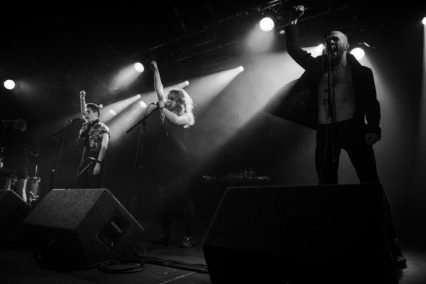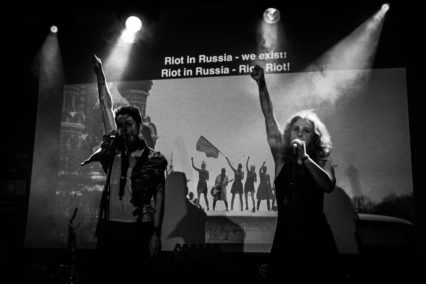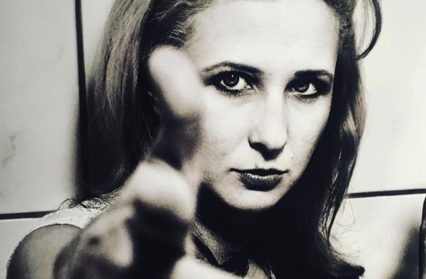Ahead of Pussy Riot’s UK Riot Days tour, Cerith Mathias spoke to Maria Alyokhina, a central member of the collective to discuss the show, their recent protests and her advice to First Minister Carwyn Jones on feminism.
Riot Days, Pussy Riot’s latest stage show arrives in Cardiff’s Tramshed this Thursday. Promising audiences ‘punk, electronica, theatre, activism, and protest’, Riot Days is based on Maria Alyokhina’s book of the same name detailing the infamous Pussy Riot ‘Punk Prayer’ protest in a Moscow cathedral in 2012. The group’s first political action, criticising the head of the Russian Orthodox church and President Putin, resulted in 2-year sentences in a penal colony in Siberia for Alyokhina and fellow founding member Nadezhda ‘Nadya’ Tolokonnikova.
 The group, Riot Days producer Alexander Cherparukim is keen to stress, is not a band, but rather a ‘protest art collective’, made up of many members staging ‘political actions’ in different locations, often at the same time.
The group, Riot Days producer Alexander Cherparukim is keen to stress, is not a band, but rather a ‘protest art collective’, made up of many members staging ‘political actions’ in different locations, often at the same time.
Nadya Tolokonnikova led Pussy Riot’s first US tour this spring, while last month members of the collective made international headlines by running on to the pitch during the World Cup final dressed as police officers and high-fiving the players. Each was sentenced to 15 days in prison.
Maria Alyokhina herself very nearly didn’t make it to the UK-leg of the Riot Days tour, due to a foreign-travel ban imposed for her part in a protest outside the headquarters of the FSB, Russia’s security agency against a ban on the messenger service Telegram. Despite the restrictions, Alyokhina evaded Russian border guards to travel to Edinburgh for the first of a fortnight of performances throughout the UK.
Cerith Mathias: You had difficulty leaving Russia for the UK last week. What battles are you fighting at the moment?
Maria Alyokhina: I’m banned now from leaving Russia. I came to the airport and I was stopped by the FSB Border Control and they gave me a paper that said I’m not allowed to leave Russia anymore. This ban was made by the court police because of our last actions in front of the FSB building. The only free messenger telegram service was banned in Russia because the head of the messenger service refused to give the FSB an option to read our messages. It’s actually against our constitution which gives us a right to privacy and a right to a private life. So Pussy Riot came to the front of the FSB building with paper planes to throw as a symbol of the messages, and after half an hour we were arrested, and then we spent 48 hours in the police station. After that the court gave me Community Service which I refused to do. So, they made the decision to ban me from leaving the country.
What is the core message of Pussy Riot’ political actions, such as the FSB protest and the World Cup Final protest?
Maria Alyokhina: We are protesting for freedom. The World Cup action was against the prison terms for political activists, against the prison terms for the innocent people who are writing what they want to write on social media – because in Russia now you can be jailed for Facebook Posts, for re-posts, for Tweets and so on. We are fighting for the freedom for people to be able to say what they want to say.
What else is important to you as a group?
Maria Alyokhina: Prison reform. I spent two years in prison. After that we started to fight for the rights of prisoners. We’ve helped a lot more people to be, let’s say, safe in prison. Because now in Russia there are hundreds of cases of torture inside prison, and nobody knows about it. Our last action was in front of the prison service where we came with a huge sign saying, ‘The Prison Department is the New Gulag.’ It’s really like this: what you know from the books of Soviet dissidents is still alive. It’s not the past, it’s not just a part of history. We’re telling the truth, and we believe that this truth can be useful for people not to repeat the terrible experience of the last century in our country.
You’re currently touring with Riot Days, which is based on your book. In the book you say, ‘to break down an inch is to give a mile.’ What motivates you to keep protesting when the punishment faced is often very severe?
Maria Alyokhina: My heart. I do what I feel I need to do. And people. Because I meet a lot of people who were totally out of politics before our meetings or collaborations, and they’ve been inspired somehow by what we’ve done. Also, I think, I’m not doing something unique, I do what I can to make our country better than it is.
Pussy Riot began with a focus on Russia — over the years, that focus has widened — some of the collective have just come back from your first US tour. What impact has global politics had on your message?
Maria Alyokhina: Nadya (Nadezhda Tolokonnikova, Pussy Riot’s co-founder) did the US tour, she spent one year living there. She made the video ‘Make America Great Again’. It’s a big challenge for the United States now. It’s the beginning of a long road for the country. In 2016 I performed with the Belarus Street Theatre in the UK, so I know about Brexit also. I spoke with a lot of students who were in the audience of our performances. After the Brexit vote, young people understood how important it is to be politically active. How important it is to know what’s going on in your country. It’s a really good sign, but it’s not enough. I believe that our Riot Days show can help to show people what can happen.
 Who are your feminist inspirations? As mentioned, some of the collective have just returned from the US – do you see parallels with the Riot Grrrl movement there?
Who are your feminist inspirations? As mentioned, some of the collective have just returned from the US – do you see parallels with the Riot Grrrl movement there?
Maria Alyokhina: Yes, there are parallels. We met Kathleen Hanna, of course she was one of our inspirations. I’m a big friend of Tobi Vail, who was the drummer in Bikini Kill. I love Guerrilla Girls and Marina Abramovic and artists from Russia – underground rock bands, and other rock bands from the time of Perestroika in the late 80s. It’s the music I grew up with.
Riot Days is coming to Wales this month. Is this Pussy Riot’s first time Wales? What can people expect from the show?
Maria Alyokhina: It’s our first time in Wales. They can expect a lot of music, a lot of noise and many statements. Our message is riot. Our show can be a guide for it, but the final decision always stays with the person who decides to go on the street to protest.
The First Minister of Wales, Carwyn Jones has said he wants to make Wales a ‘feminist nation’, with ‘a feminist government’ and ‘the safest place to be a woman in Europe’ — what advice would you give to him?
Maria Alyokhina: It’s a good statement. My opinion is feminism is about equal rights and about a voice. It’s important to hear the voices of women. I live in a country where in some regions women can be beaten with stones because they wore a short skirt. It’s really important to know the experience of Russia, or to know what’s going on for women in the Middle East. We have to listen to the stories of women. I want women to have their voices heard, to not be shamed or beaten because of how they look and dress. Simple things. I can’t give just one piece of advice, because there’s a lot. I can speak with him about it.
Riot Days comes to Tramshed, Cardiff on Thursday August 24th
You might also like…
Upon the publication of her book, ‘Petticoat Heroes’, a study of popular protest in the Rebecca riots, author Rhian E. Jones draws parallels between the inspiring insurrection of the period and the radical protest movements of the 21st century.
Cerith Mathias is a regular contributor to Wales Arts Review.












